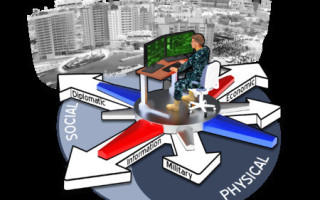DARPA program aims to clarify adversaries' intentions during simmering conflicts
NewsMarch 16, 2018

ARLINGTON, Va. The Defense Advanced Research Projects Agency's (DARPA?s) Strategic Technology Office has announced a new program it calls COMPASS, which stands for Collection and Monitoring via Planning for Active Situational Scenarios.
It is aimed at military use in what in recent years has been coined “gray zone” conflict, because these situations sit in a nebulous area between peace and conventional warfare. Whereas conventional conflict is fairly straightforward, gray-zone action is not openly declared or defined, it is slower, and it is prosecuted more subtly, using social, psychological, religious, information, cyber, and other means to achieve physical or cognitive objectives with or without violence. The lack of clarity of intent -- the so-called "grayness" -- makes it challenging to detect, characterize, and counter an enemy fighting this way.
COMPASS intends to develop software that would help clarify enemy intent by gauging an adversary’s responses to various stimuli. The software will leverage advanced artificial intelligence technologies, game theory, and modeling and estimation to identify stimuli that yield the most information about an adversary’s intentions while providing decision-makers with high-confidence intelligence on how to respond; the software will list both positive and negative tradeoffs for each course of action.
Fotis Barlos, DARPA program manager, says of COMPASS: “The ultimate goal of the program is to provide theater-level operations and planning staffs with robust analytics and decision-support tools that reduce ambiguity of adversarial actors and their objectives. As we see increasingly more sophistication in gray-zone activity around the world, we need to leverage advanced AI and other technologies to help commanders make more effective decisions to thwart an enemy’s complex, multi-layered disruptive activity.”
DARPA officials say that the COMPASS program will leverage game theory in developing simulations to test and understand various potential actions and possible reactions by an adversary employing gray-zone activity. Barlos quickly noted, however, that the program is not focused on developing new sensory technologies, virtual reality systems, or other advanced hardware but rather aims to develop advanced software that would quickly present options to decision-makers by assimilating a large amount of intelligence collected using existing state-of-the-art systems (such as standard video exploitation or textual analysis tools) related to rapidly changing scenarios.
“We’re looking at the problem from two perspectives," Barlos said. "Trying to determine what the adversary is trying to do, his intent; and once we understand that or have a better understanding of it, then identify how he’s going to carry out his plans -- what the timing will be, and what actors will be used. The first is the what, and second is the where, when, and how."
“But in order to decide which of those actions is important you need to analyze the data, and you need to understand what different implications are and build a model of what you think the adversary will do,” he said. “That’s where game theory comes in. If I do this, what will the adversary do? If I do that, what might he do? So it is using artificial intelligence in a repeated game theory process to try to decide what the most effective action is based on what the adversary cares about.”
The COMPASS program seeks experts in AI, machine learning, game theory, modeling and simulation, control systems, estimation, and other related fields and has scheduled a Proposers Day for March 30, 2018, in Arlington, Virginia. Registration instructions and other details are available on FedBizOpps (FBO): https://go.usa.gov/xQqjt. A Broad Agency Announcement (BAA) solicitation is expected to be posted on FBO prior to the Proposers Day and will be available on DARPA’s FBO solicitation page: http://go.usa.gov/3W53j.






